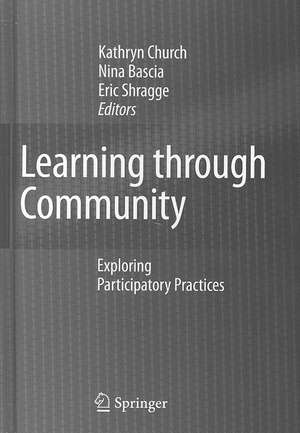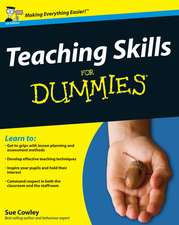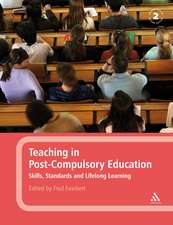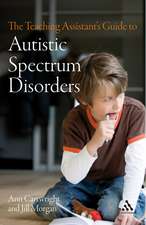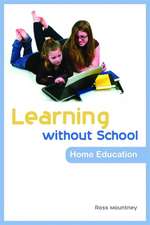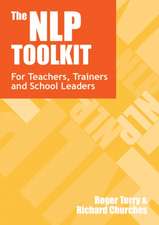Learning through Community: Exploring Participatory Practices
Editat de Kathryn Church, Nina Bascia, Eric Shraggeen Limba Engleză Hardback – 12 feb 2008
| Toate formatele și edițiile | Preț | Express |
|---|---|---|
| Paperback (1) | 637.28 lei 6-8 săpt. | |
| SPRINGER NETHERLANDS – 19 oct 2010 | 637.28 lei 6-8 săpt. | |
| Hardback (1) | 642.51 lei 6-8 săpt. | |
| SPRINGER NETHERLANDS – 12 feb 2008 | 642.51 lei 6-8 săpt. |
Preț: 642.51 lei
Preț vechi: 755.88 lei
-15% Nou
Puncte Express: 964
Preț estimativ în valută:
122.96€ • 127.90$ • 101.51£
122.96€ • 127.90$ • 101.51£
Carte tipărită la comandă
Livrare economică 12-26 aprilie
Preluare comenzi: 021 569.72.76
Specificații
ISBN-13: 9781402066535
ISBN-10: 1402066538
Pagini: 214
Ilustrații: XVI, 214 p.
Dimensiuni: 155 x 235 x 20 mm
Greutate: 0.48 kg
Ediția:2008
Editura: SPRINGER NETHERLANDS
Colecția Springer
Locul publicării:Dordrecht, Netherlands
ISBN-10: 1402066538
Pagini: 214
Ilustrații: XVI, 214 p.
Dimensiuni: 155 x 235 x 20 mm
Greutate: 0.48 kg
Ediția:2008
Editura: SPRINGER NETHERLANDS
Colecția Springer
Locul publicării:Dordrecht, Netherlands
Public țintă
Popular/generalCuprins
Out of Bounds: Situating Ourselves.- The Turbulence of Academic Collaboration.- Participation and Learning in Turbulent Times: Negotiations Between the Community and the Personal.- From the “Margins”: Case Studies.- Women, Violence and Informal Learning.- Stigma to Sage: Learning and Teaching Safer Sex Practices Among Canadian Sex Trade Workers.- Informal Civic Learning Through Engagement in Local Democracy: The Case of the Seniors' Task Force of Healthy City Toronto.- While No One is Watching: Learning in Social Action Among People who are Excluded from the Labour Market.- Knowledge Collisions: Perspectives from Community Economic Development Practitioners Working with Women.- Teacher's Informal Learning, Identity and Contemporary Education Reform.- Learning Through Struggle: How the Alberta Teachers' Association Maintains an Even Keel.- Formalizing the Informal: From Informal to Organizational Learning in the Post-Industrial Workplace.
Recenzii
"It makes a timely and significant contribution to adult learning theory and practice. It does so at a time when adult learning is very much on the agenda of academics, policy makers and organizational leaders in both formal in informal sectors around the globe."
Nancy Jackson, OISE/UToronto, Canada
"For readers who have been searching for provocative analyses of "informal learning" that eschew the tepid and the technical, this book offers both powerful intellectual challenge and sobering stories. Here, struggle is a core theme and risky persistance the predominant strategy, as both authors and editors plunge into the contradictions of learning as participation in key spaces of social life: between formal institutions and movements for social change. The actual turbulences that are "informal learning" are theorized here as negotiating difficulty through simultaneous openings and closings in complicated networks of cultural action: practices of identifying, organizing, disturbing, aspiring, innovating, mobilizing, preserving and sustaining. While they stretch the debates and discourses of informal learning, the authors also resist these frames, calling forth new appreciations for the complexity of learning through community. These tales of learning at junctures of war, stigma, democratic action and hope will haunt you."
Tara Fenwick, Department of Educational Studies, The University of British Columbia, Canada
"For those interested in how complex it is to work collaboratively over a number of years on themes of common interest, the book's several introductory chapters are unusually transparent. This is a group of editors and authors who have refused to cover over the complexities of collective academic publishing by producing a seemingly grand narrative style introduction and a well-behaved list of chapter titles all standing up to be seen and accounted for. Students and other scholars will recognize, if not enjoy, the descriptionsof the collaborative process and the frustration and ultimate victory in getting this particular set of papers finally between two covers!
[While the groups they studied are marginal], the authors are most certainly not marginal. They are at the heart of understanding the learning dimensions of citizenship, social movements, survival, and celebration. Their work is fundamentally central to society today and they should seize this territory. To understand one's scholarly location in another way feels to me as accepting the distorted lens of the powerful who constantly project the views of the rick, the male, the straight and the white."
Bud Hall, Director of the Office of Community Based Research, University of Victoria, Canada
Nancy Jackson, OISE/UToronto, Canada
"For readers who have been searching for provocative analyses of "informal learning" that eschew the tepid and the technical, this book offers both powerful intellectual challenge and sobering stories. Here, struggle is a core theme and risky persistance the predominant strategy, as both authors and editors plunge into the contradictions of learning as participation in key spaces of social life: between formal institutions and movements for social change. The actual turbulences that are "informal learning" are theorized here as negotiating difficulty through simultaneous openings and closings in complicated networks of cultural action: practices of identifying, organizing, disturbing, aspiring, innovating, mobilizing, preserving and sustaining. While they stretch the debates and discourses of informal learning, the authors also resist these frames, calling forth new appreciations for the complexity of learning through community. These tales of learning at junctures of war, stigma, democratic action and hope will haunt you."
Tara Fenwick, Department of Educational Studies, The University of British Columbia, Canada
"For those interested in how complex it is to work collaboratively over a number of years on themes of common interest, the book's several introductory chapters are unusually transparent. This is a group of editors and authors who have refused to cover over the complexities of collective academic publishing by producing a seemingly grand narrative style introduction and a well-behaved list of chapter titles all standing up to be seen and accounted for. Students and other scholars will recognize, if not enjoy, the descriptionsof the collaborative process and the frustration and ultimate victory in getting this particular set of papers finally between two covers!
[While the groups they studied are marginal], the authors are most certainly not marginal. They are at the heart of understanding the learning dimensions of citizenship, social movements, survival, and celebration. Their work is fundamentally central to society today and they should seize this territory. To understand one's scholarly location in another way feels to me as accepting the distorted lens of the powerful who constantly project the views of the rick, the male, the straight and the white."
Bud Hall, Director of the Office of Community Based Research, University of Victoria, Canada
Textul de pe ultima copertă
This book is a collection of case studies that explore the learning that people do through community engagement. Developed within a network of Canadian researchers and their community partners, it explores learning that is organized by the learners themselves, collectively, rather than as individuals. Reflecting the contributors’ political priorities, the volume begins with groups that are highly marginalized in our society: immigrant women, sex trade workers, senior citizens, garment workers, women doing community economic development, and people who identify with disability and anti-poverty movements. It then shifts to consider groups whose members have been accustomed to seeing themselves as ‘centered:’ or mainstream: teachers, for example, and employees of the new ‘learning organizations.’ Regardless of their location, the people involved are learning to labour and to survive the turbulence of rapid socio-economic change in the global economy. These case studies trace the enduring effects of gender, class, language, race, and governmentality on their efforts. Significantly, they also probe the possibilities for oppositional action.
"It makes a timely and significant contribution to adult learning theory and practice. It does so at a time when adult learning is very much on the agenda of academics, policy makers and organizational leaders in both formal in informal sectors around the globe."
Nancy Jackson, OISE/UToronto, Canada
"It makes a timely and significant contribution to adult learning theory and practice. It does so at a time when adult learning is very much on the agenda of academics, policy makers and organizational leaders in both formal in informal sectors around the globe."
Nancy Jackson, OISE/UToronto, Canada
Caracteristici
Highlights the scope of learning that people engage in through community participation Extends existing boundaries and sets new parameters for the scholarly consideration of adults’ learning Features an unusual hybridization of conceptual traditions, and scholarly disciplines Highlights the learning of groups that are typically overlooked due to (and reinforcing) their marginalization Reflexively reveals the editors as learners through engagement in a scholarly network and collaboration in editorial production Begins from a Canadian perspective to engage with broader international debates
